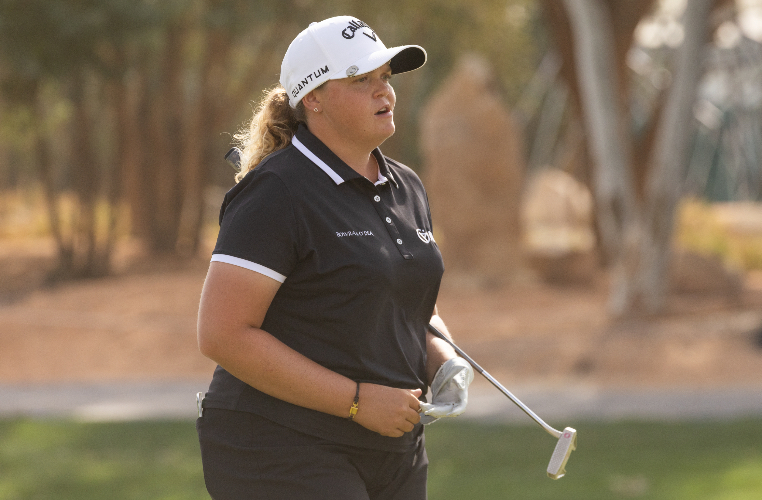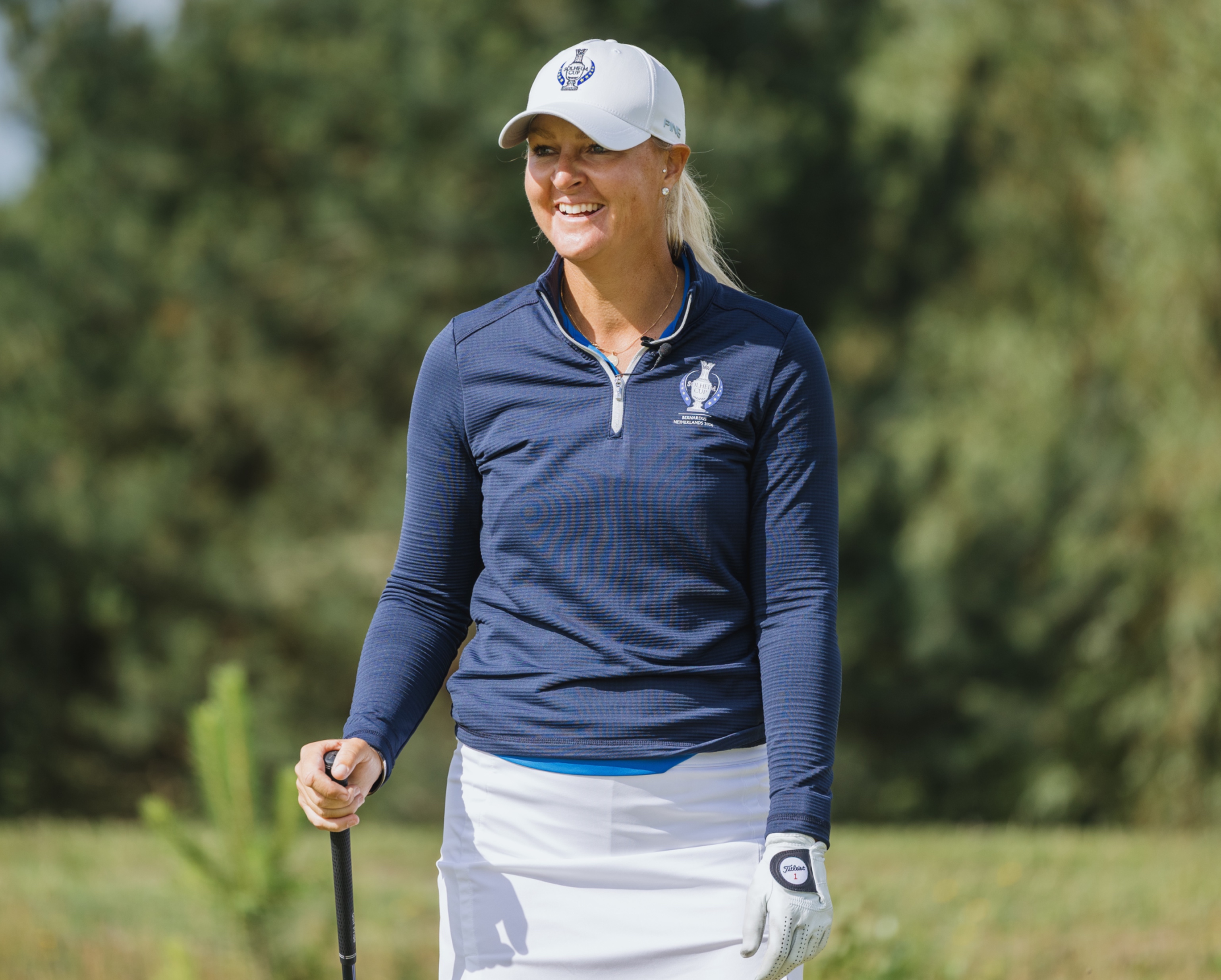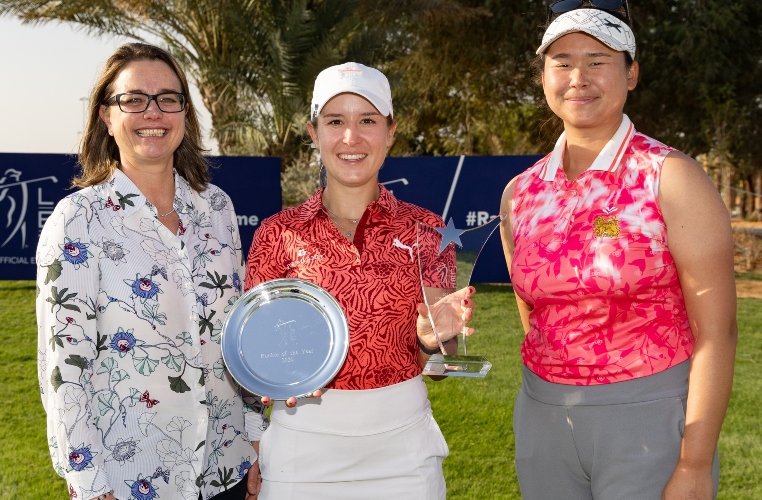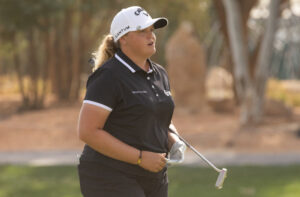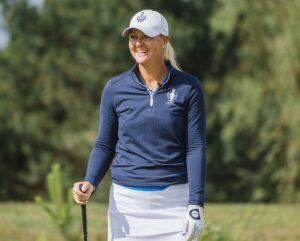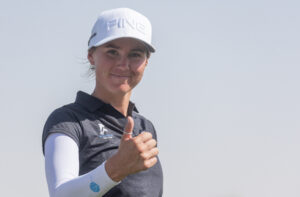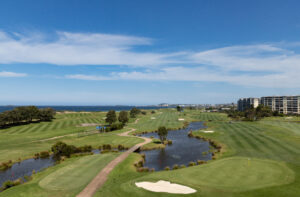Alexandra Armas, the CEO of the Ladies European Tour (LET), recently announced she will step down from her position after a six-year tenure at the organization.
After earning a golf scholarship at Wake Forest University and earning a master’s degree in business, she played professional golf on the LET for four years from 2001-2005. She served almost eight years as the organisation’s Executive Director before setting up her own sports marketing consultancy. Armas returned to take on the role of CEO in late 2019, reporting to the newly formed LPGA-LET Joint Venture Board of Directors. She quickly rebuilt the LET schedule and brand, driving the business to create more opportunities for its members.
She sat down with Juan Luis Guillén to speak about the announcement during The Amundi Evian Championship.
Q. Looking back at your first day as the CEO of the Ladies European Tour (LET), what did you expect and how has that compared to what’s happened in these last six years?
ALEXANDRA ARMAS: COVID happened.
I had been the CEO of the LET before, between 2005 and 2012; then I left and started consulting.
I was very proud and pleased of the kind of tenure I had back then. The LET reached out to the LPGA, as they were looking at doing the joint venture to try and rebuild the European schedule because it was struggling.
I started just consulting and helping in that kind of process. I was a very big believer in the LPGA and the LET working more closely together.
As you know golf is very fragmented, and there are a lot of organisations and entities, so I think uniting the women’s game makes us stronger and more impactful together. I thought it was a very exciting opportunity to be involved in that.
And then, through that process they asked whether I would help see through that kind of vision of unifying the women’s game to help build a schedule for the players again.
So, yeah, it excited me so I decided that I would come back. I hoped that the LET would be re-energised with the support of the LPGA, and that we could build our core schedule in Europe again.
We got great traction. The first schedule we released for 2020 looked very good. It was quite an improvement from the previous year. And then COVID hit.
But luckily enough, we were in the joint venture with the LPGA. That’s when all the golfing governing bodies came together to navigate the challenge together.
Since then, the priority has been and will always be playing opportunities for athletes.
Q. Nowadays, everyone talks about the potential of women’s golf, as a vision, and as a great investment. It seems like you saw that potential seven years ago.
ALEXANDRA ARMAS: I’ve always been involved in the LET and in women’s golf. I was a professional golfer before that. I’ve always been amazed at the talent and engagement of the athletes, the approachability, and the value proposition of women’s golf compared to other sports.
It’s great to see now that the rest of the world is catching up and realizing that women’s sports are also great to follow and to watch.
Q. So when you sell women’s golf to a partner or sponsor, what is your argument?
ALEXANDRA ARMAS: Well, I mean, it’s a great environment but I think it’s a great sport, and I’m just a big fan of the athletes.
I’ve been here a few days [at The Amundi Evian Championship] talking to sponsors, with some playing the pro-am yesterday – they were all buzzing. They all loved it. In particular, they love how it’s so interactive when they play with the professionals.
The players are also really engaging. That’s kind of different I guess to many sports. You can’t always get so close and so inside the ropes. Then you go into the value proposition of our television coverage, TV reach, digital content, all the other elements and those numbers are tracking really well.
Q. You mentioned the fragmentation of golf in general. Is women’s golf in a better position to avoid that level of fragmentation?
ALEXANDRA ARMAS: I think what we as LET and what the LPGA are very keen on is that we have to have harmonious environments that we can thrive in. We have to be open to engaging with like-minded organizations, sponsors, partners, and stakeholders.
There are so many elements that come into putting on a tournament and running a Tour, but we have to tap into all those opportunities and maximize them.
I think relationships play such a big part in all of this and it’s all about working together, and pooling resources that will be additive to the game, rather than fragmenting it and everybody working in their own silo.
Q. What’s the best part of the relationship with the LPGA? What do you think should be the relationship in the future between LET and LPGA?
ALEXANDRA ARMAS: I think the best part is that we both have an alignment in what we do. We’re all trying to provide the best platform so that our athletes can do what they do best. That’s our biggest asset.
That’s very much our journey in parallel, being able to share experiences, collaborate, and enhance each other’s opportunities. They’re bigger; they have more resources, so for us to be able to tap into that also helps.
It’s the synergy between the organizations that allows us to achieve more than we would do separately.
Q. Women’s golf is probably one of the most international sports. How do you manage and embrace that?
ALEXANDRA ARMAS: That we’re global?
Q. Yes.
ALEXANDRA ARMAS: I mean, you know, it’s something that’s quite personal to me. Any young talented female golfer should be able to find a pathway to the top of the women’s game.
So for us, playing in all these different countries, collaborating with all the various Tours, and bringing that pool of athletes together gives opportunities to athletes to kind of find their way to the top of the game.
I think our responsibility is to bring golf around the world. If you look at the leaderboard in any of our tournaments or the LPGA tournaments you have so many different nationalities. We play in so many countries but also have such wide representation from players from different nationalities.
That enriches us and also increases our fan base.
Q. Does that global reach give you an advantage in terms of partners and sponsors?
ALEXANDRA ARMAS: Yeah, of course but there are a lot of partners that are specific to one market. For example, in Asia, we have athletes from those countries, and it definitely helps to be able to customize what you’re offering to your partners if you have a variety of options.
Q. So now looking towards your last day, what would be your message to the next CEO of the LET?
ALEXANDRA ARMAS: There is a lot I guess, but what one thing that stands out to me is to be courageous, and to think outside the box.
I think as you say, women’s golf is on a great trajectory, but we also have to consider what is next. How are we going to differentiate ourselves? Let’s not just do what the men are doing because it works for them.
We have the opportunity to do things differently and to tap into a slightly different perspective of the game.
Golf is a traditional sport, but the way people are consuming golf, the way people are engaging with the game, the way that the game is changing itself, let’s consider how we can get our talented athletes represented out in the world.
Q. And finally, what would be your message to Craig Kessler, the incoming LPGA Commissioner?
ALEXANDRA ARMAS: He’s going to be fine. I’ve had a few conversations with him and met him a few times. He comes from golf which is great, as I think initially – the environment is so complicated – there are so many stakeholders to get to grips with that, but he’s going to hit the ground running.
I would say brace yourself, because it’s a lot and there are a lot of opportunities. It’s exciting, but it’s big. You’re going to have to look at many things, but I think all of them are positive.
And to be patient. Obviously, things are not going to happen immediately. It’s kind of making the right moves at the right time and making the most of it.
